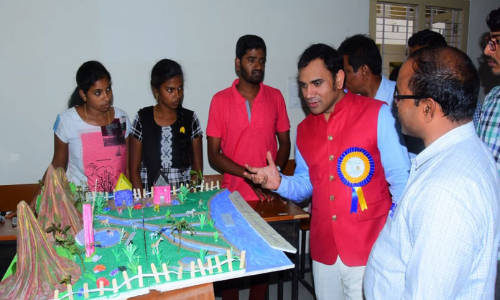Involve communities in saving river waters

Unlike other districts in the state of Andhra Pradesh, the three districts, Srikakulam, Vizianagaram and Vishakhapatnam in the northern coastal AP, are blessed with fresh water bodies in abundance
Srikakulam: Unlike other districts in the state of Andhra Pradesh, the three districts, Srikakulam, Vizianagaram and Vishakhapatnam in the northern coastal AP, are blessed with fresh water bodies in abundance.
In total, northern AP coastal districts procure 200 TMC ft of water every year from two major rivers namely Nagavali and Vamsadhara along with their tributaries including Bahudaa, Mahendra Tandava, Suvarnamukhi, Gostani, Meghadrigedda, Sharada, Vegavathi, Bodderu, and Champavathi. With more than 40,000 water tanks, reservoirs and water falls, these three districts constitute one-third of water sources in the state. Yet they are plagued and polluted and are not fit for human and animal consumption for a variety of reasons.
Although the rivers of Uttrandhra districts are instrumental in supplying water to various needs, its quality remained very poor. APCB has awarded ‘C’ category to the river waters of Nagavali and Vamsadhara as there is high presence of coliform bacteria in these rivers, indicating mixing of human faeces. A river with ‘A’ category water quality is pure and can be used with minimal treatment. To be qualified as ‘A’ category, the water should not have more than 50 MPN/100 ml and the ‘B’ category should not have more than 500 MPN/100ml.
Factors like population pressure, urbanisation and industrialisation affect the water quality. Excessive human intervention and the indiscriminate rush for mechanisation and industrialisation has resulted in the violation of laws of nature, damaging the natural resources like land, water and air. Factors like deforestation, urbanisation and violation of nature’s law by releasing the toxic industrial waste, and the mix of drainage water are the basic factors for river water contamination.
Originating from the Southern Odisha, the river Nagavali flows towards Srikakulam in Northern AP, covering 256 kilometres (161 km in Odisha and the rest in AP). Jhanjavati, Barha, Baldiya, Satnala, Sitagurha, Srikona, Gumudugedda, Vottigedda, Suvarnamukhi, Vonigedda, Relligedda and Vegavati are its tributaries. Vamsadhara originates in the border of Thuamul Rampur in Odisha, travels 254 kilometres before joining the Bay of Bengal at Kalingapatnam in Srikakulam. Mahendratanaya is its chief tributary.
Nagavali suffers heavily due to industrial and medical wastage and the drainage water flowing in its catchment area is being dumped into it. The JK Paper Mills located at Jayakyapur in Srikakulam district is directly discharging pulp and the other chemical effluents from the industry into the river. As many as 50 hospitals located in Srikakulam are also releasing waste directly into drain which is passing into Nagavali.
The river Vamsadhara is facing serious threats from the Vedanta aluminium refineries that is operating at Lanjigarh, a town in the Kalhandi district in Odisha. According to the locals of Srikakulam, a crack in the western part of red mud pond of Vedanta Alumina refinery is leading to leakages, entering the river. Toxic wastes of aluminium refinery are thus contaminating the river water here. The native people residing at Srikakulam are apprehended that the leakage may be severe or worst during the monsoon season, when heavy downpour is expected.
The governments at the Central and the State-level are already spending millions of public money in repairing the damages. Instead, there must be a mechanism that would prevent such violations. There must be a regular and periodical drive to create awareness on civilians, who should be part of monitoring and vigilance committee. Communities must be engaged in safeguarding the river waters at their respective areas and the violators, especially the MNCs must be punished severely for impinging the fresh water bodies.
Dr Srinubabu Gedela completed PhD from Andhra University and post-doctorate from Stanford University. The research work is part of Pulsus Group CSR activity










